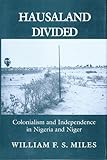Hausaland Divided : Colonialism and Independence in Nigeria and Niger / William F. S. Miles.
Material type: TextSeries: The Wilder House series in politics, history, and culturePublisher: Ithaca, NY : Cornell University Press, [2016]Copyright date: ©2016Description: 1 online resource (388 p.) : 18 halftones, 3 drawings, 10 mapsContent type:
TextSeries: The Wilder House series in politics, history, and culturePublisher: Ithaca, NY : Cornell University Press, [2016]Copyright date: ©2016Description: 1 online resource (388 p.) : 18 halftones, 3 drawings, 10 mapsContent type: - 9780801470103
- 966.26/004937 23/eng/20230216
- online - DeGruyter
| Item type | Current library | Call number | URL | Status | Notes | Barcode | |
|---|---|---|---|---|---|---|---|
 eBook
eBook
|
Biblioteca "Angelicum" Pont. Univ. S.Tommaso d'Aquino Nuvola online | online - DeGruyter (Browse shelf(Opens below)) | Online access | Not for loan (Accesso limitato) | Accesso per gli utenti autorizzati / Access for authorized users | (dgr)9780801470103 |
Frontmatter -- Contents -- Illustrations, Maps, Tables, and Figures -- Preface -- A Note on Hausa Orthography -- 1. Introduction: Rehabilitating the Borderline -- 2. The Setting -- 3. Ethnic Identity and National Consciousness: Who Are the Hausa? -- 4. Boundary Considerations -- 5. Colonizing the Hausa: British and French -- 6. According to the Archives ... -- 7. Chieftaincy in Yardaji and Yekuwa -- 8. Arziki vs. Talauci: The Economic Comparison -- 9. Educating the Hausa -- 10. Islam: The Religious Difference -- 11. Village Cultures Compared -- 12. Transcending the Tangaraho -- Appendix A. Fieldwork Strategy: The Choice of a Site -- Appendix B. Administration of Self-Identity Surveys -- Appendix C. Selected Characteristics, Daura Local Government and Magaria Arrondissement, 1978-1985 -- Appendix D. Extracts from Anglo-French Treaties Delimiting the Nigeria-Niger Boundary, 1906-1910 -- Appendix E. Communique of the Nigeria-Niger Transborder Cooperation Workshop, Kano, July 2-8, 1989 -- Appendix F. Glossary -- Bibliography -- Index
restricted access online access with authorization star
http://purl.org/coar/access_right/c_16ec
How have different forms of colonialism shaped societies and their politics? William F. S. Miles focuses on the Hausa-speaking people of West Africa whose land is still split by an arbitrary boundary established by Great Britain and France at the turn of the century.In 1983 Miles returned as a Fulbright scholar to the region where he had served as a Peace Corps volunteer in the late 1970s. Already fluent in the Hausa language, he established residence in carefully selected twin villages on either side of the border separating the Republic of Niger from the Federal Republic of Nigeria. Over the next year, and then during subsequent visits, he traveled by horseback between the two places, conducting archival research, collecting oral testimony, and living the ethnographic life.Miles argues that the colonial imprint of the British and the French can still be discerned more than a generation after the conferring of formal independence on Nigeria and Niger. Moreover, such influences persist even in the relatively remote countryside: in the nature of economic transactions, in local education practices, in the practice of Islam, in the operation of chieftaincy. In Hausaland as throughout the world, the border illuminates the vital differences between otherwise similar societies.
Mode of access: Internet via World Wide Web.
In English.
Description based on online resource; title from PDF title page (publisher's Web site, viewed 26. Apr 2024)


